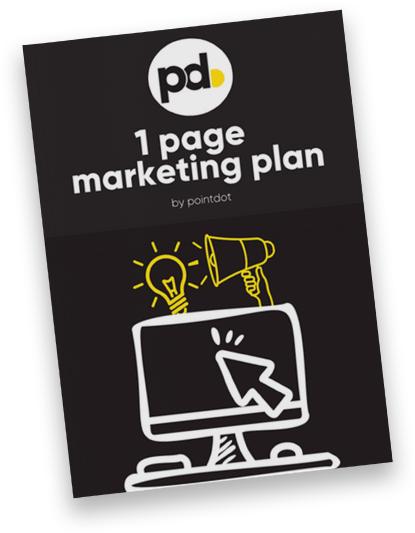
Landing Page vs Website: Which Should You Use?
The terms website and landing page are sometimes used interchangeably, as they are technically both types of web pages. However, there are key differences between the two.
Websites and landing pages are crucial components of successful digital marketing campaigns – it’s important to understand how they differ so that you know which one you need. In this article, we’ll go over what constitutes a landing page vs. a website, the difference between a landing page and a website, and how to know which is best for your business.

What Is A Website?
A website is a collection of pages online, with each serving a specific purpose. Typically, the way the website pages are categorised and what content is included on each web page will depend on your objective.
Let’s say you run a business that sells products through your online store. You would likely have a page that explains your business, its history, company values, and other pertinent information. You’ll probably also have a dedicated page that explains each product you offer.
This way of organising information is not exclusive to business websites – this structure can apply to any topic or niche. For example, an artist’s portfolio website would have a page explaining their experience. Instead of pages that showcase products, they might have individual pages that explain each art exhibit or piece.
What Is A Landing Page?
A landing page is typically composed of a single page that serves a specific purpose, typically a call-to-action to be performed by a visitor. When comparing a landing page vs a home page, the latter is the initial page you see when you visit a website, while the former is where a visitor “lands” after clicking on a specific link or ad.
Landing pages are commonly used in PPC campaigns such as paid social campaigns or Google search ads. When an ad is clicked on, it directs visitors to the landing page, where they are presented with a call-to-action.

Common examples of a call-to-action on a landing page include a promo coupon, a free trial for a subscription, or a downloadable eBook. There are many other types you can use when creating landing pages, but what they all have in common is that they encourage a visitor to do a particular action.
Landing pages are typically designed specifically for running ad campaigns, which is why it’s a single page. Landing pages typically only have the topline information needed to convince the visitor to take up that particular action.
So, what is a landing page in a website, ultimately? The answer to this is simple. When businesses create landing pages for a particular campaign or promo, these subpages are often hosted on the website. A website can have multiple different landing pages. For example, one landing page for a special limited-time promo and another for a special subscription plan.
That said, landing pages don’t necessarily have to be folded into an existing website. While some brands prefer to do this, others may develop a page with a domain name (aka microsite) that is unique to a campaign.
Key Difference Between Website vs Landing Page
The key differences between a landing page vs. a website lie in their objectives, design, and roles in an overall marketing campaign. It’s important to know that there is no “better” choice between the two. Each serves a unique purpose, and, more often than not, brands will have both a website and a landing page running at the same time.
Let’s take a look at the main ways landing pages differ from websites:
- A website has multiple pages while a landing page is composed of just one.
- A landing page includes content that is optimised for an ad campaign while website content covers a broader topic scope.
- A website has a navigation feature that allows you to move between other pages while a landing page typically does not.
- Both a landing page and a website can be used as the link for an ad campaign. However, landing pages are more commonly used for this purpose.
When To Use A Landing Page
An action-oriented landing page is best suited for marketing campaigns that involve a specific and measurable objective. For example, increase sign-ups for a webinar or get more people to avail of a certain promo.
Let’s take a look at some examples of when best to use a landing page.
Lead-To From PPC Ad Campaigns
We highly recommend using a dedicated landing page instead of a website to lead your target audience if you’re running a pay-per-click ad campaign. Having a great landing page that is specifically designed to maximise landing page traffic from potential customers will help you get the most out of your advertising budget.
This is because landing pages are much more specifically geared towards influencing a desired action from visitors, such as sign-up, register, or enquire further. In contrast, websites are designed to inform and educate.
Examples of such campaigns include a paid social campaign, running Facebook ads, a paid local search campaign, or a Google Display Network campaign.

Design As Lead Magnets
A lead magnet is an excellent tactic for generating qualified business leads. Lead magnets ask visitors to fill in their details in exchange for free content from the brand. Some examples of free content in a landing page designed to be a lead magnet include a downloadable eBook, slot in a webinar, or free trial for a subscription.
This is especially useful for collecting information on qualified leads. The information visitors enter (typically a name and email) can be later used in an ad campaign that is more specifically targeted.
When To Use A Website
Website designs are not as direct and straightforward as landing pages. However, the upside of this is that it allows you to have more space for other features and information visitors may find useful.
Let’s take a look at some examples of when best to use a website in place of a landing page.
Build Your Brand
A website is an excellent marketing tool to tell the story of your brand. Think of your website as a digital business card or elevator pitch, except you have more room to show off what your brand offers.
Below are some examples of pages you can include to build a stronger brand identity:
- About page: On an about page, you can explain the history of your brand, its values, mission and vision, as well as any other relevant information.
- Products/Services page: If you provide multiple products or services, you can have dedicated individual pages for each one of them that explain what they are, how they work, and why your customers should purchase them.
- FAQ: If you find that many customers tend to ask the same questions when they reach out, create a page that addresses these questions on your website. This lessens the number of steps customers may take to purchase from your business and empowers them with information.
Provide A Specific Function
Websites allow you to make use of more complex and dynamic tools to market to or as a service for your customers. This is an inherent benefit to having multiple different pages, as opposed to just one.
For example, a hotel website typically has a function wherein customers can directly reserve dates for their stay. Another example is banks that include calculators on their websites, which visitors can use to gauge how much they can earn by investing.
Final Thoughts
There has never been a competition about whether it’s better to have a landing page or a website. It truly depends on what the short- and long-term objectives are for your brand and marketing campaign. If anything, it’s recommended that you do a bit of both.
What’s more important is that you understand the unique benefits each can provide for your business. If you’re equipped with this information, you’ll have a better time utilising both to your maximum advantage.

1 page marketing plan.
Since 2016, pointdot has grown by adopting the same marketing principles in this 1-page plan, into our own agency and business. We have grown from a 2-person team, to a team of 11 super talented marketers. Download your free copy of this brilliant 1-page marketing plan and begin growing your business!

